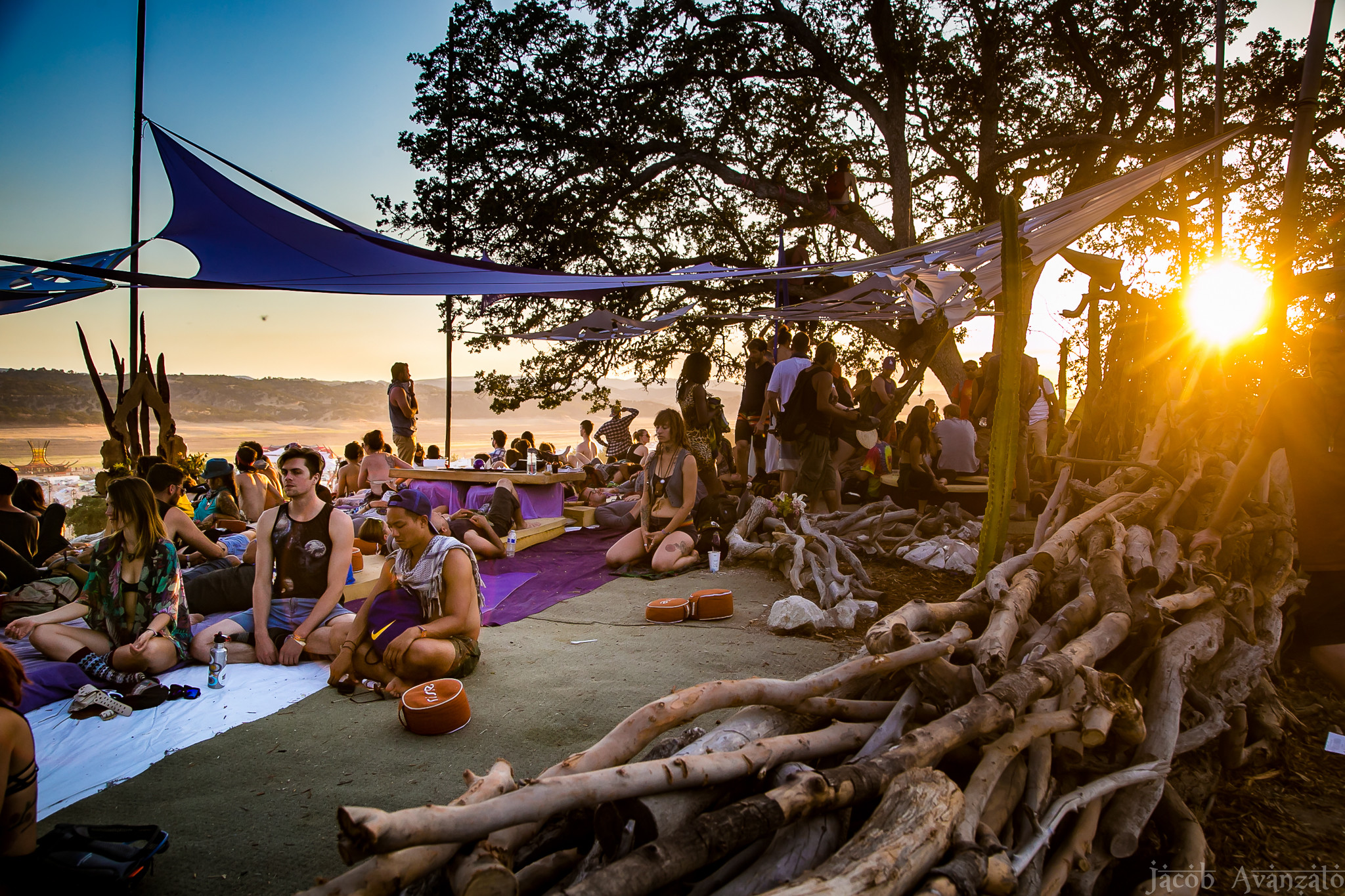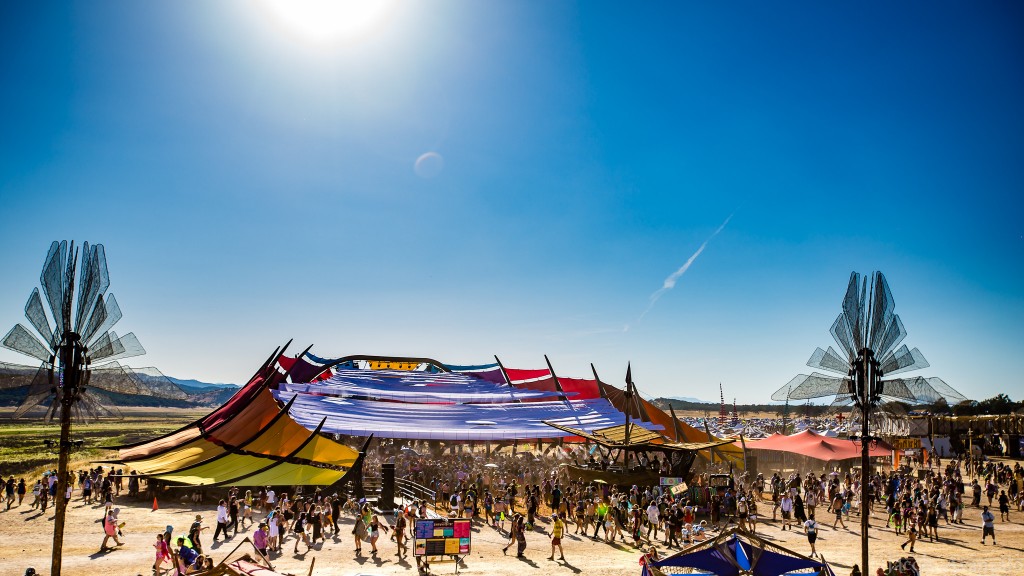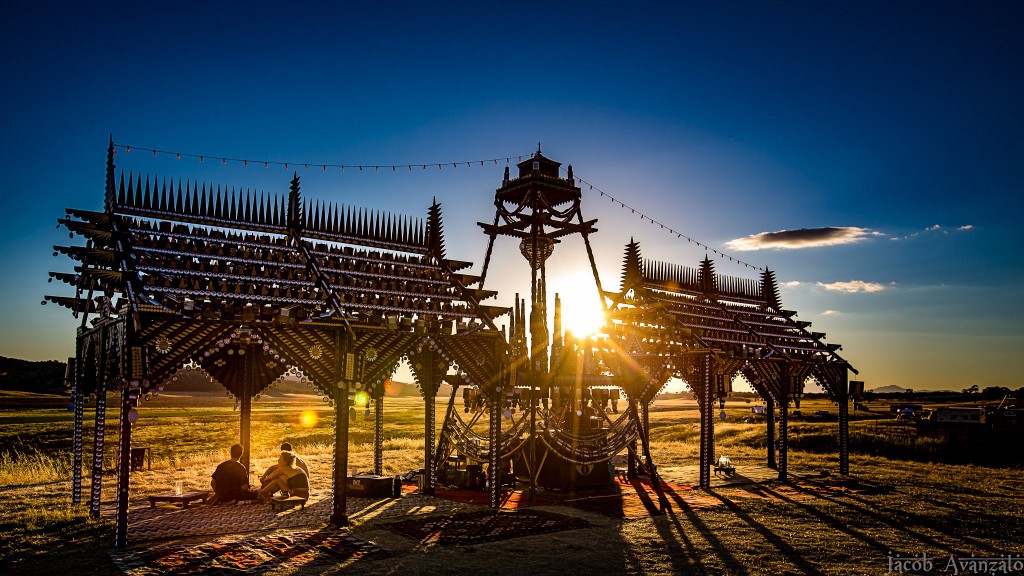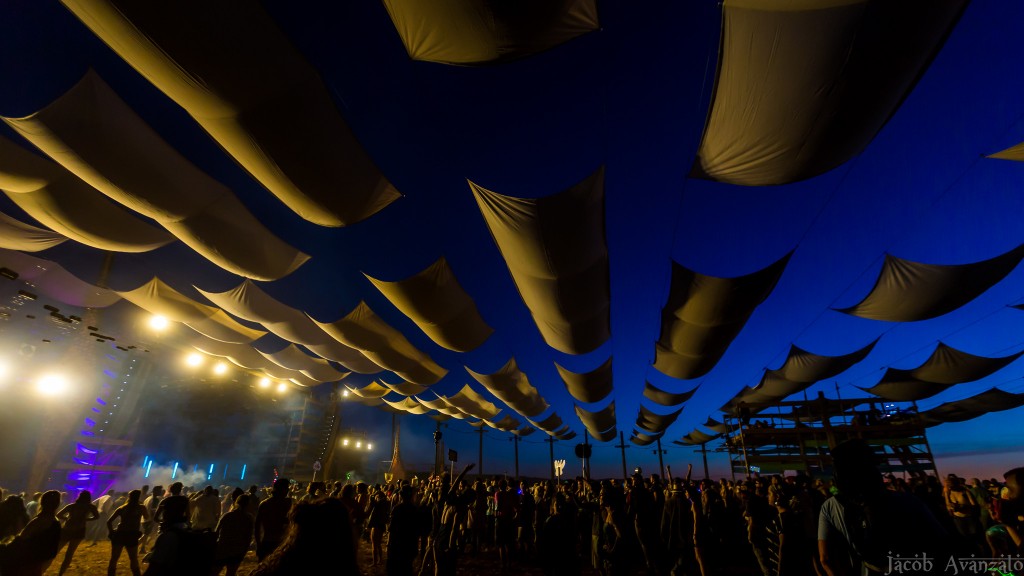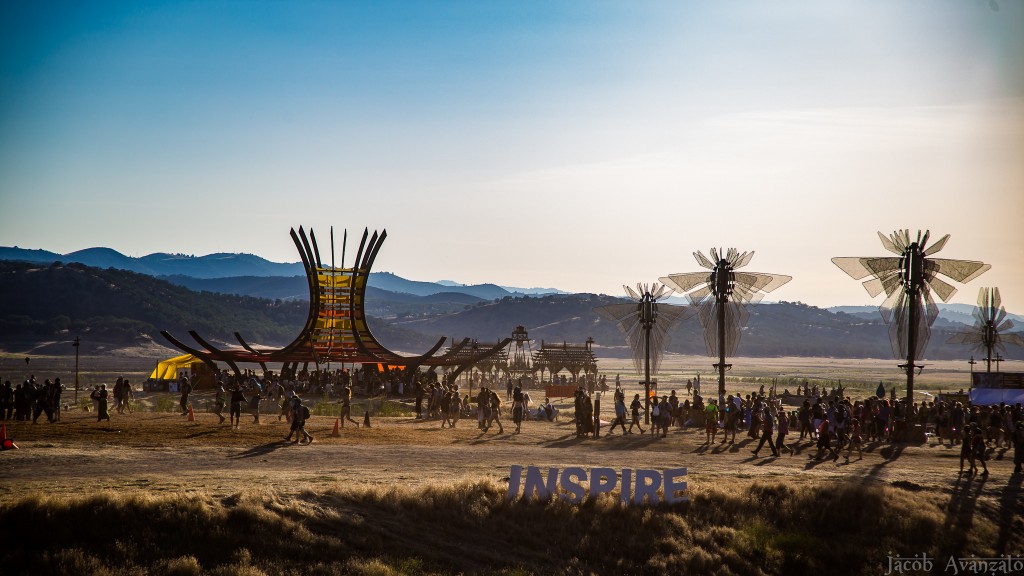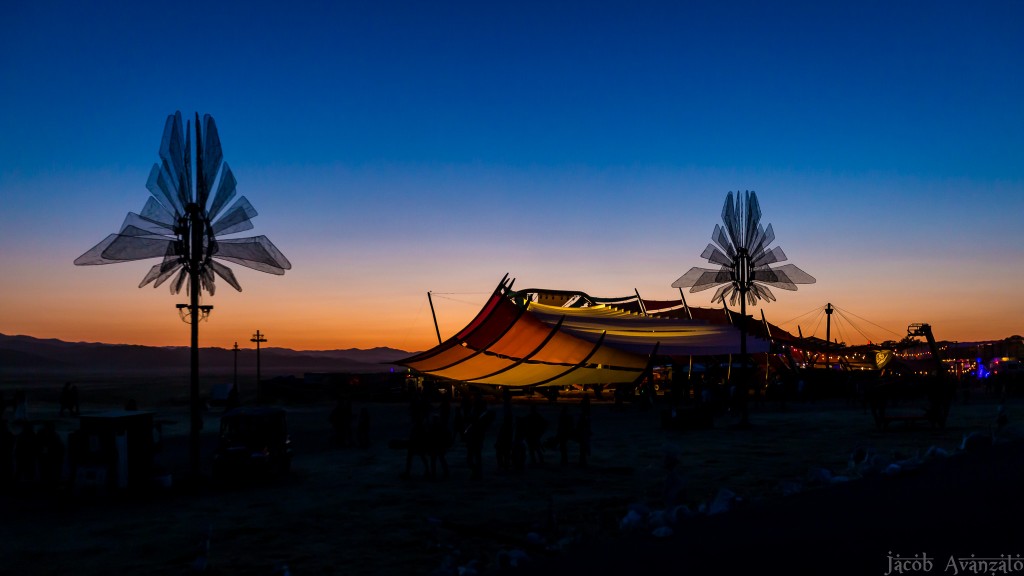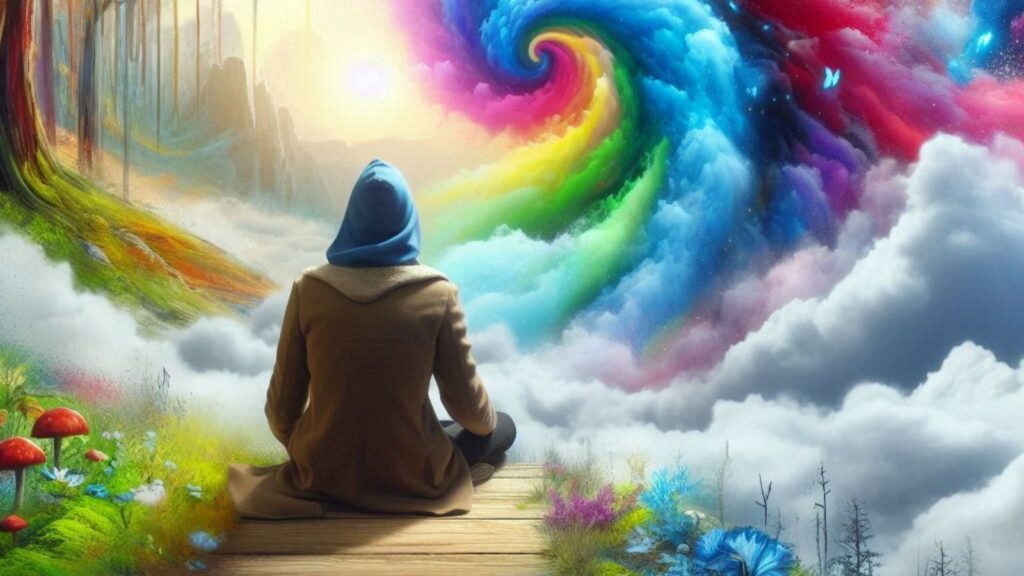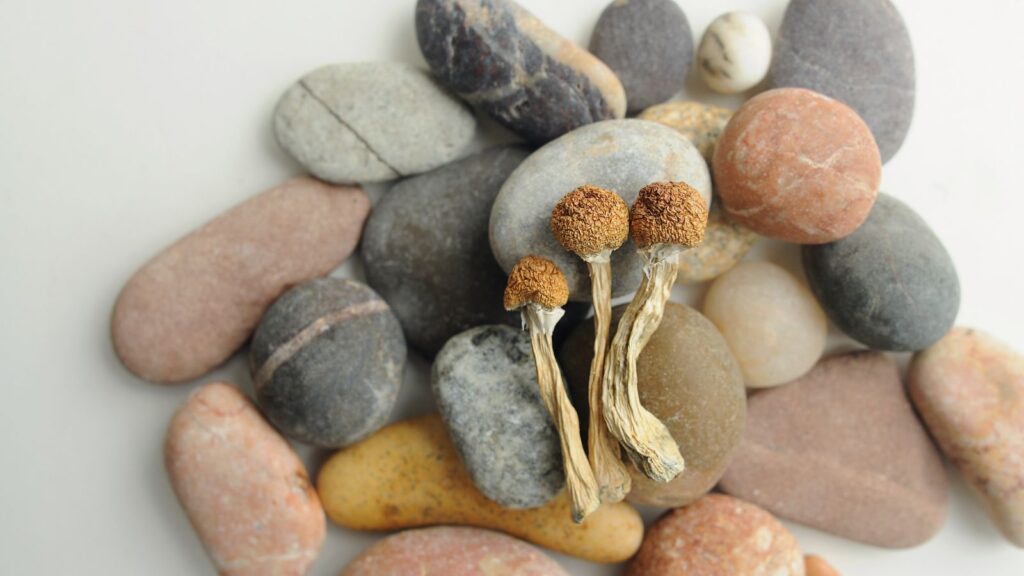The folks at the Do LaB keep a packed schedule. The L.A. based production company’s intricately designed stages and whimsical art installations lend a distinct presence to festivals all over the world, and the list of events that they are producing or appearing at grows each year.
Now in its 11th year, Lightning in a Bottle (LIB) is the Do LaB’s signature event. This year’s sold-out arts and music festival took place Memorial Day weekend at the San Antonio Recreation Area in Central California. Tens of thousands of attractive young revelers descended on this bone-dry reservoir for music and yoga, lectures and ritual. With its roots in the Burning Man arts festival, Lightning in a Bottle has become one of the flagships of the “Transformational Festival” movement. And the Do LaB is the team that makes it all happen.
I first met the Do LaB’s work in 2013 when I attended Lightning in a Bottle and was immediately struck by the quality and innovation of the production. Like Burning Man, LIB is filled with interactive art pieces and quirky experiences awaiting exploration. Both are able to offer such diversity of programming by hosting many smaller camps and stages, each responsible for creating their own experience. Unlike Burning Man, the quality and artistry is consistently high. The Do Art Foundation’s Lightning in a Paintcan is reputedly the largest live painting event in the country; art is literally everywhere, much of it being created before your eyes. The whimsical aesthetic of the event carried throughout the festival grounds and translated to wonderfully cheerful and genuinely heart-filled human interactions. The entire festival had been carefully curated.
Three years on, I returned again as the festival continues to grow, selling out 20,000 tickets well in advance this year. As the pictures below attest, this year’s festival was still aesthetically beautiful, and light-hearted surprises abounded. But I was also aware that there were certain challenges present with the larger size and younger crowds.
After the 2016 festival I was blessed with an opportunity to speak with Dream Rockwell, co-founder of the Do LaB. Dream is also co-founder and executive producer of the performance troupe Lucent Dossier Experience which is responsible for much of LIB’s interactive, neotribal-meets-vaudeville-meets-circus aesthetic. We spoke about the rewards and challenges which Transformational Festivals offer their participants, both those paying to attend and the teams which are working to bring them about.
Jordan Walker: It must be a really interesting experience for you to have watched up close and personal as the Do LaB has gone from throwing a private birthday party to the major production company that it is today. You also have this dual perspective as both a festival organizer and as a performer. Maybe you could talk me through what you have been able to witness from the festival’s main stage as Lucent Dossier performs at LIB each year. How have you noticed the crowd change over the past decade?
Dream Rockwell: The audience has grown increasingly bigger and younger over the years. It’s incredible to gaze out from onstage and see this sea of joyful and ecstatic faces so present and in the moment, loving life. The festival experience is clearly making an imprint on these young people as many of them are finally living life in the present moment. We’ve had the experience at other large festivals of performing in front of a massive crowd of people all viewing the show from behind the screens of their phones. I think young people are increasingly spoon-fed their experiences and are really craving more point-of-contact experiences. LIB provides these young people a break from their phones and their virtual worlds and an opportunity to wake up to what is taking place right here, right now.
As someone who produces events myself, I’m in awe of the coordination an event the size and scale of LIB must take. I’m curious to hear about the culture of the support staff behind the scenes, building the infrastructure and collaborating to pull all of the various aspects of LIB together.
It’s a little difficult to speak about what the production staff are experiencing because it can be so varied from one person to another or from day to day. We live with each other for several weeks in preparing and dismantling all of this infrastructure and it’s impossible to hide ourselves from one another. It’s inevitable that some of my time and energy at the festival goes toward allowing for each individuals’ emotional experience.
I remember my time in the more traditional work place when I was an employee, and how emotions had absolutely no space for expression. People weren’t exposing their feelings to each other, and we were made to pretend that these aspects of our selves had no bearing on what we were doing. With a festival like LIB, there is a very different culture around groups achieving goals together. People process through things together. In this way, our festival crew becomes a little terrarium for earth, and we get to see everything. We work and grow together. It’s really beautiful.
It is also a little bittersweet for me, because in the early days I would spend most of my time out in the festival having an experience close to everyone working as well as the participants. But now there are over 4,000 people working and volunteering at the festival, and I might not personally know them or them me. So it’s not as intimate for me – there’s more separation. But that’s all part of the growth experience.
What are some of the challenges that you see facing Do LaB as Lightning in a Bottle continues to grow and evolve?
I see the challenge of conveying our central purpose and intention to new people who continue to come to LIB. But it doesn’t scare me; it’s part of the growth process. There is a feeling that in recent years Burning Man wasn’t able to hold onto their ideals. There is a sense that something came off track. A big part of that is concerning social class. An energy of rich vs. poor has become a prominent feature where it never was before. The wealthy plug-n-play camps are very damaging for the main principles that used to guide the culture out there. So much of who I am today was born on the playa, and we are cheering them on as they strive to correct this. I feel responsible for making sure that something similar doesn’t happen to us. And it’s certainly not easy. This year there were moments where I had to ask “Wait – are we still on track?” As festival producers I believe it’s our responsibility to keep asking ourselves these types of questions as we move forward. And at the end of the festival, l left with a positive feeling about what we’d been able to do altogether.
Clearly, you all pride yourself on making Lightning in a Bottle more than just a music festival. There is a clear focus on the elements that have become hallmarks of the “Transformational Festival” culture: environmental awareness, live painting and interactive art, workshops and skill building, etc. The Temple of Consciousness hosts speakers and workshops each year, and I’m curious how you’ve experienced this educational aspect evolving.
The Temple of Consciousness was present at the first LIB as something called the “Healing Dome” and has continued to expand each year since. The intention has always been to curate a mind expansion journey. This year the theme of the Temple was influenced by a conversation taking place around what is being called indigenous intelligence. What did ancient cultures know that we no longer do? We have always felt that it’s important to bring cutting edge conversations to the table. I don’t know what direction this all might be heading in, but I think that it’s important that we continue to explore new ideas, stay cutting edge, ask difficult questions, question everything, expand ourselves and support freedom of speech. That’s what we’re trying to do at the Temple of Consciousness.
I remember in my own life the incredible impact that certain experiences had when I was younger. I remember lyrics to songs in a way that I never was able to remember by memorizing them in school. I believe as festival producers we have a huge opportunity to present new ideas and to bring more to the table then just the music and party element. I believe people want more. The information that comes into your life at these transformational moments can have an enormous impact. This is why the immersive experiences at LIB are as important as any name on the lineup.”
I agree with you about the potential for personal and inter-personal exploration at these festivals. Over the years I’ve watched how these blissful “We’re all one” mountain-top experiences can sometimes be difficult to integrate into the daily reality of one’s post-festival life. There is a lot of darkness out there in the world these days. How does that influence you personally as you do the work you do?
My current understanding is that in the darkest places is where we need the brightest light. If it’s true that we live in a corrupt environment that is not supportive of spiritual work, then it is up to us to clean up that environment. I hope to be part of that very real awakening that is happening. We need spiritual warriors. We need community. That’s what we’re building together.
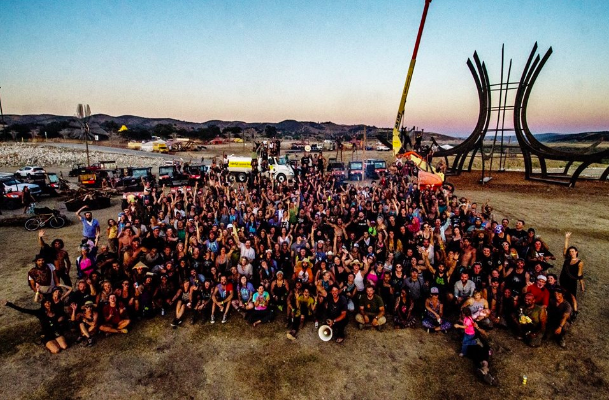
Photographs by Jacob Avanzato
